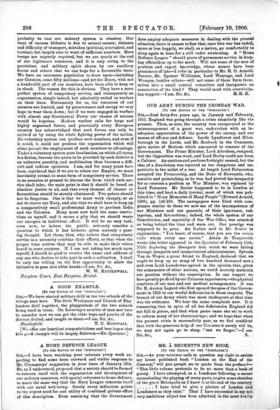OUR ARMY DURING THE CRIMEAN WAR.
[To THE EDITOR OF TAR "SPECTATOR:] SIR,—Just forty-five years ago, in January and February, 1855. England was going through. a crisis singularly like the present. Then, as now, the country was exasperated at the mismanagement of a great war, undertaken with an in- adequate appreciation of the power of the enemy, and our means of offence and defence. Lords Lyndhurst and Ellen- borough in the Lords, and Mr. Roebuck in the Commons, gave notice of Motions which amounted to censure of the Government. The Prime Minister, Lord Aberdeen, resigned, but the Opposition was weak, and Lord Derby could not form a Cabinet. An anxious and perilous fortnight ensued, but the idea of a dissolution was rejected as too dangerous and un- patriotic in the midst of a war. At length Lord Palmerston accepted the Premiership, and the Duke of Newcastle, who, amiable and painstaking as he was, had proved his incapacity for so onerous a position as War Minister, was replaced by Lord Pan mure. Mr. Senior happened to be in London at this time, and kept a daily journal, most of which was pub- lished in "Many Memories of Many People" (Edward Arnold, 1898), pp. 148 210. The newspapers were filled with coin- plaints similar to those we now see of the incompetence of our Ministers and our generals, of their ignorance, red. tapeism, and favouritism ; indeed, the whole system of our Constitution, and especially of the War Office, was attacked as being behind the time and worn out. Our prestige was supposed to be gone. An Italian said to Mr. Senior in explanation : "You know, of course, that you are the voisin. riche whom every one envies." Alexis de Tocqueville wrote (the letter appeared in the Spectator of February 11th, 1855) deploring the disrepute into which we were falling through incapable and inexperienced administrators. Sylvain Van de Weyer, a great friend to England, declared that we ought to keep up an army of two hundred thousand men ; and even Lord Lansdowne agreed in the opinion that, given the armaments of other nations, we could scarcely maintain our position without the conscription. In one respect we have greatly profited by our Crimean experiences,—the physical comforts of our men and our medical arrangements. It was Sir H. Austen Layard who first opened the eyes of the Govern- ment in 1855 to our woeful deficiencies in those respects. The branch of our Army which was most inadequate at that time was the ordnance. We hear the same complaint now. It is reassuring that in spite of all her deficiencies England did not fall in pieces, and that when peace came she set to work to reform many of her shortcomings; and we hope that when the present crisis is successfully past, as we feel confident that with the generous help of our Colonies it surely will be, we may not again go to sleep, "lest we forget."—I


































 Previous page
Previous page